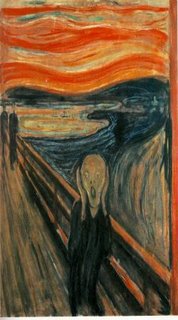There is a lot of talk today about the importance of journeying and I'm one of the people who talks a lot about journeying. However David Wells in Above All Earthly Pow'rs suggests that this contemporary theme of journeying resembles little of the biblical theme of journeying. Wells argues that that traditional Christian spirituality (especially on journeying) is one that flourishes within doctrinal parameters (realities of who God is and whoGod calls us to be), demanding that the self live within these parameters. By contrast, contemporary journeying begins with the self. It is rooted in human autonomy and the self is allowed to pick and mix and choose whatever rings its bells. The validation of sources it picks and mixes is whatever benefits the self psychologically and therapeutically. Mixing and matching, discarding and reappropriating ideas is what modern spirituality is all about. Wells quotes Zygmunt Bauman (who I've only read when quoted in other books) who suggests that people today are tourists rather than pilgrims. Now, I've read some who see this postitively! In a pick and mix world the Christian faith has many treasure to put out for spiritual tourists to sample in the hope that they may come to faith in Christ. I myself have tired to encourage and do this. But Wells heavily critiques this approach: 'Tourists are not rooted in the places they visit. They are just passing through, just looking. They are only there for their pleasure and entertainment. They are unrelated to their fellow travelers. They contribute nothing to the country they are visiting (except their cold cash) because they are only there to look and to take in a fresh set of experiences. Tourists never stay; they are always on the move. It is this image, rather than that of the pilgrim, that appears to describe most aptly this new, privatised, experimental spirituality.'
Wells then quotes this poem from Mark Greene called 'Tourists'
Tourists; that’s what we are becoming…
Tourists, we move through life, flitting from idea to idea, from novelty to novelty, from new person to new person,
Never settling, always moving…
Selecting the best sights, the highlights, the choice cuts, avoiding the mess on the edge of town, the slums, all the uncomfortable things, the struggle of really knowing people
Never settling, always moving lest we hear the hollow clang of our own emptiness…
Tourists, that’s what we are becoming…
Inquisitive, curious, picking up the tidbits of other people’s depth…
Tourists, flicking through our snapshots, the paper thin trophies of our click and run existence, filing them away, loading the next roll of film
Never settling, always moving,
Tourists; that’s what we are becoming,Tourists; that's what we are becoming…I've been chewing on this for the last week. There's a certain ouch factor as I find it hard to swallow and digest...

